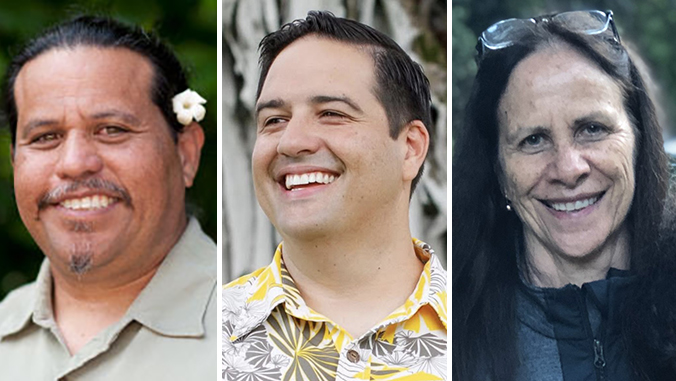
Three scholars from the University of Hawaiʻi at Mānoa College of Education (COE) have been invited to participate on a presidential panel by the American Educational Research Association (AERA). Margaret Maaka, Kekailoa Perry and COE alumnus Kamuela Kimokeo were selected for their outstanding educational research and will be recognized during the 2023 AERA Annual Meeting in Chicago, Illinois on April 13–16.
Annually, more than 13,000 scholars from around the world attend the AERA meeting, making it the largest professional gathering of educational researchers. Invited presidential sessions are reserved for scholars the AERA Annual Meeting Program Committee recognizes as authorities in their research areas.
Highlighting the importance of Indigenous research
Perry, an associate professor from the Department of Educational Foundations, will participate in an invited presidential session panel with Kimokeo, the director of the Hawaiʻi Music Institute and head of the music program at Windward Community College, who earned his PhD in curriculum and instruction.
Their panel, titled “Whose truth matters in education research? Deconstructing, Reconstructing, and Advancing Indigenous Truths in the Pacific Region (and beyond),” will explore the effectiveness of approaches that position research as critical and potentially transforming for Indigenous communities that are the most impacted by imperialism, colonialism, racism and oppression underpinning much of the miseducation of Indigenous people’s experiences.
During the panel, Perry will present his research on the legitimization of racism and colonial-like occupation through intergenerational miseducation in higher education. Kimokeo will present his research on song composition and performance as educational tools of personal empowerment. Perry and Kimokeo will be joined by scholars Tanya Wendt Samu of University of Auckland, Maung Nyeu of Harvard University and Te Rina Warren of Massey University.
Maaka, a Department of Curriculum Studies professor, will serve as the session chair alongside Huia Tomlins Jahnke of Massey University who will serve as the session discussant.
“The worldwide colonization of Indigenous communities and their interests through education is not a singular issue but formed through multiple sites, in multiple ways, and often simultaneously,” said Tomlins Jahnke. “Education research has often been complicit in maintaining power over what ideas and findings matter and from whose perspective is prioritized in pursuing truth. Issues of race, inequality and justice systematically impede Indigenous folk from participating in the pursuit of truth through education.”
For more, visit the COE website.


